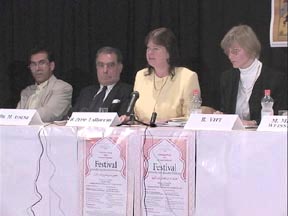
Highlights | Calendar | Music | Books | Concerts | Links | Education | Health
What's New | LaRouche | Spanish Pages | Poetry | Maps
Dialogue of Cultures
Schiller Institute Holds German-Iranian Festival on Dialogue of Cultures
A Festival of Persian and German Poetry,
Wiesbaden, April 20, 2002
Dusseldorf, April 27, 2002
Two cities in Germany, Duesseldorf and Wiesbaden, were the scenes of extraordinary events sponsored by the Schiller Institute and the German-Iranian Theatre Forum on April 20 and April 27, respectively. The theme of both was "Living Dialogue Instead of War of Cultures—A Festival of Persian and German Poetry"—a theme that therefore presented a direct challenge to the ruling "Clash of Civilizations" culture.
 |
|||
|
Helga Zepp LaRouche and Others Participate in German-Persian Festival
|
|||
The symposium began with a presentation by Helga Zepp LaRouche, founder of the Schiller Institute, entitled "Unity in the Manifold: the Culture of the Silk Road." She immediately went into the middle of the battlefield, so to speak, by taking on Samuel Huntington's concept of a coming "Clash of Civilizations," and his thesis that there cannot be an understanding among the different religions. This viewpoint, she contrasted to Cardinal Nicholas of Cusa's concept of unity in manifold, and his "De Pace Fidei" dialogue, in which representatives of religions from all over the world are led to discover the basis for collaboration and peace, despite their doctrinal differences. Even though the political circumstances today are different, Zepp LaRouche said, the preconditions are the same as after the fall of Constantinople, when Cusa wrote the famous dialogue.
She elaborated the fundamental concept that renaissance periods in mankind's history have influenced each other, and helped each other to come to bloom. This is a clear example of what the German poet and historian Friedrich Schiller called "universal history." Zepp LaRouche discussed the historical role of Persia, in particular. In the end, she read four small poems by Saadi, which was a delight for the audience.
The next speech, by Vida Bahrami of the German-Iranian Theatre Forum, on "the poet Muhammad Schams-ad-Din Hafis," who lived in the 14th century, was given in Persian, with a very short German translation. The speech dealt with the life and the role of the poet Hafis.
The next speaker was Dr. Assemi, publisher of a German-Persian magazine, Kaweh. He began by reciting the opening verses of Schiller's "Die Glocke" ("The Bell") in German. (Many experts regard "Die Glocke" as the most "Persian" of all German poems.) Dr. Asswmi praised the dialogue of cultures, and warned that religion should not be misused.
The next speaker, Ahmed Rahimi-Nawardamouz, also from the German-Iranian Theatre Forum, was a young man who stated that, in their essence, all Persians are poets—they have a very metaphorical, poetical way of looking at things, and thinking.
The final speaker was Muriel Mirak-Weissbach, who spoke on "World Poetry: Translation as a Means for Understanding among Peoples," the question of translation of poetry. She spoke about Rueckert, the classical poet and translator of Persian, and about contemporary efforts by Prof. Annemarie Schimmel. - The Relevance to Today -
In the ensuing panel discussion, the current political crisis was addressed, immediately. A Palestinian addressed Zepp LaRouche, expressing his concerns about the crisis. She used the occasion to speak clearly, and challenge people to set into motion a wave of protest against the policy of the Bush Administration.
Also participating in the debate was an African exile, Jean Gahururu, who presented the problem, from an African standpoint, and denounced Israeli Prime Minister Ariel Sharon's policy as racist. - Poetry and Music -
The evening program was presented by the Dichterpflaenzchen, a poetry group sponsored by the Schiller Institute, whose members were from Duesseldorf and Wiesbaden, and a small theatre group, led by Iradj Zohari, who presented excerpts from the fairy tale "Turandot," after Elias ben Nezami. In the program, texts, poems, and songs by Nicholas of Cusa, Lessing, Rumi, Schiller, Heine, Saadi, Hafis, Goethe, Schumann, Brahms, and Schubert were presented. The Persian guests were surprised at how intensively the poetry of their homeland had been studied.
Dialogue of Cultures- Main Page
schiller@schillerinstitute.org
The Schiller Institute
PO BOX 20244
Washington, DC 20041-0244
703-297-8368
Thank you for supporting the Schiller Institute. Your membership and contributions enable us to publish FIDELIO Magazine, and to sponsor concerts, conferences, and other activities which represent critical interventions into the policy making and cultural life of the nation and the world.
Contributions and memberships are not tax-deductible.
VISIT THESE OTHER PAGES:
Home | Search | About | Fidelio | Economy | Strategy | Justice | Conferences | Join
Highlights | Calendar | Music | Books | Concerts | Links | Education | Health
What's New | LaRouche | Spanish Pages | Poetry | Maps
Dialogue of Cultures
© Copyright Schiller Institute, Inc. 2002. All Rights Reserved.